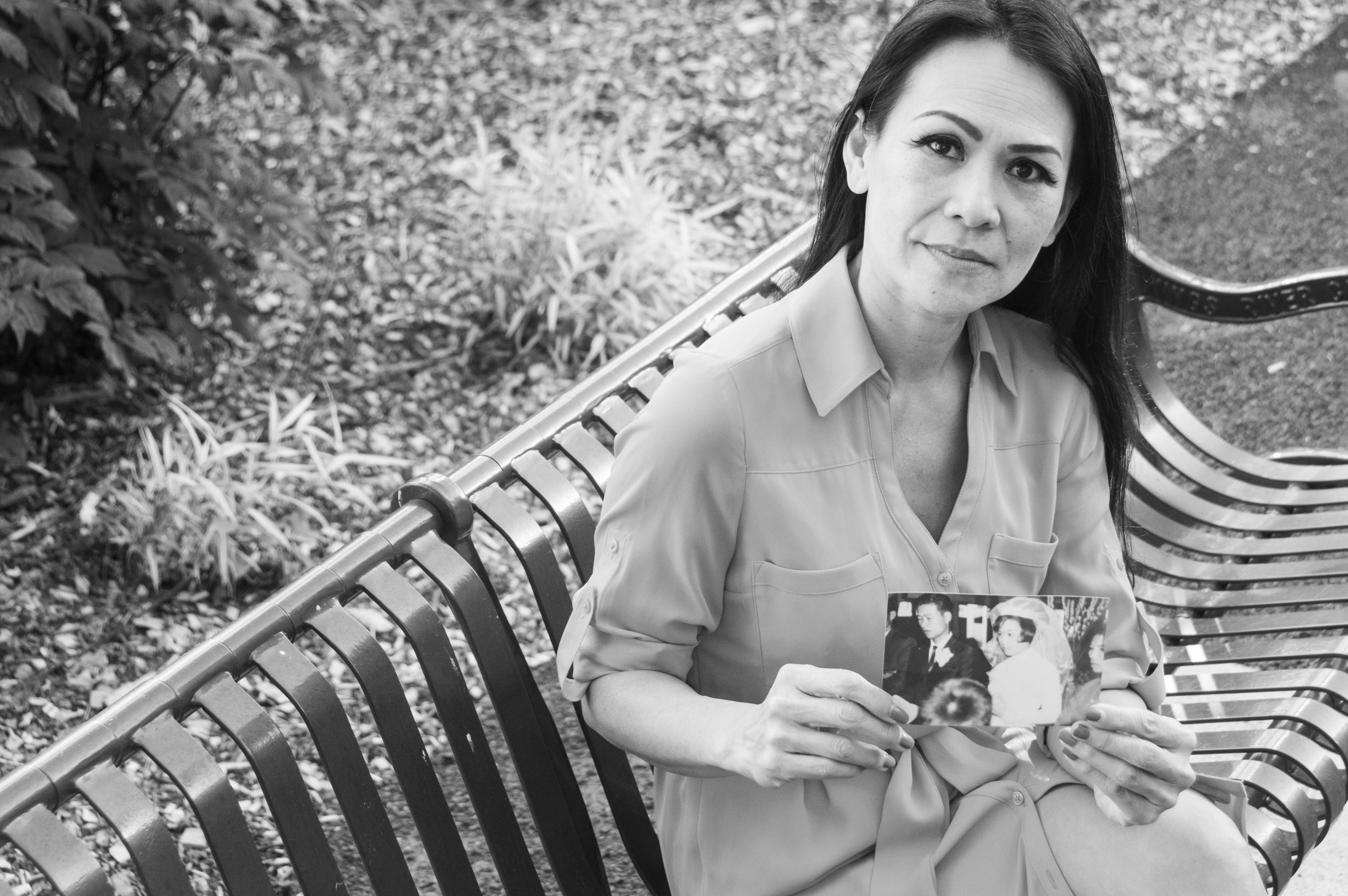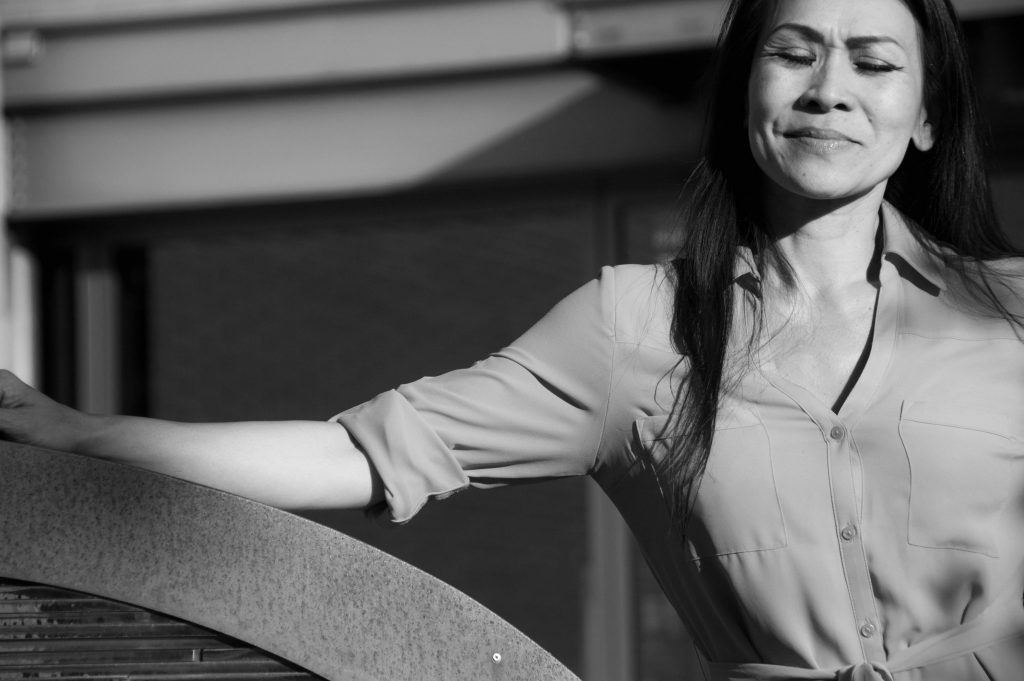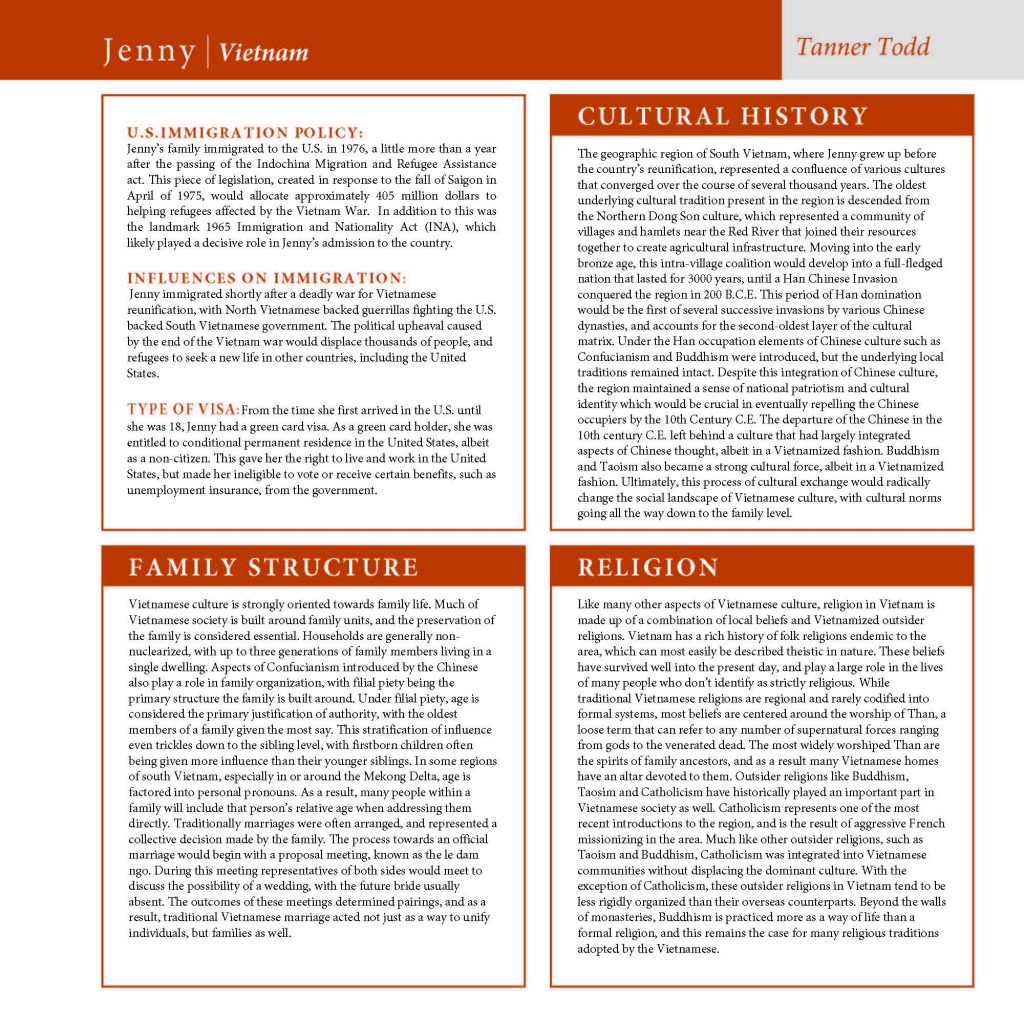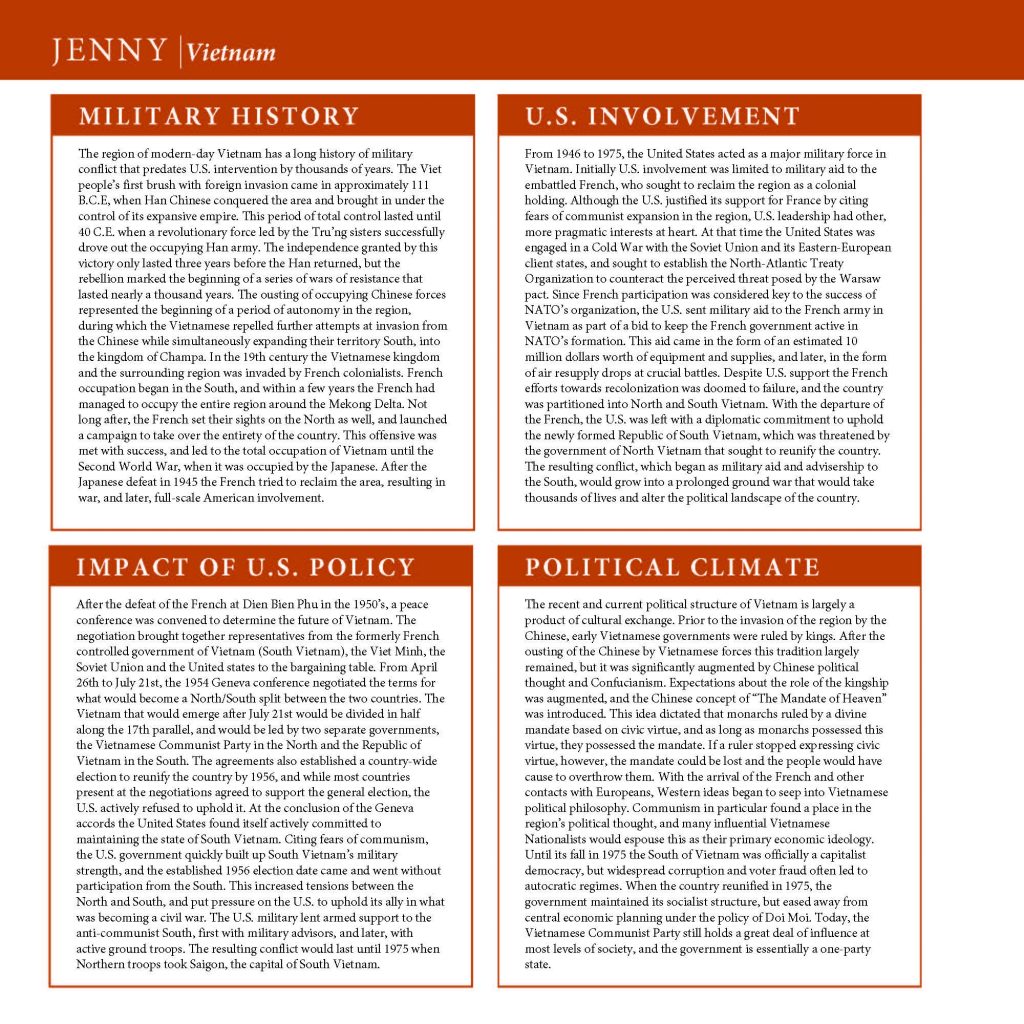
I spoke fluent French as a child. I was raised in a privileged lifestyle. My dad was a military officer, a Major and a pilot in the Air Force. The Air Force sent him to San Antonio, Texas for his flight school training. He piloted helicopters for the president of Vietnam.
I had a chauffeur who drove me from my house to school – Le Quy Don, a private school, named after a famous Vietnamese scholar, originally attended by the children of the French during the period of imperial rule when it was known as College Chasseloup-Laubat. After the French left, the school became the domain for the children of the Vietnamese elites – military generals, wealthy business owners, politicians with ties to the president.
I had to pass a test to enter kindergarten. For the test, I had to demonstrate how well I could draw and color within the lines so that they could evaluate what kind of a student I would be. I didn’t pass! My dad had to use his influence to have me admitted. At that time in Vietnam, students in a class were ranked from one to 20-25 students. I think back today about how competitive that was. No one wanted to be last. I recall being ranked tenth, eleventh, or twelfth. It was really competitive and that was our norm. Each student strived always to be on top. I was too young at the time to fully understand how stressful that was as a student because I attended only up to the fourth grade. I was not at the bottom. At the time, I didn’t know how that felt for the students at the bottom of the class in that type of environment. Now, I realize how hard and discouraging that type of system must have been for the students.
I was coasting along pretty well until I reached the fourth grade. It was 1975, the year South Vietnam fell. The end of the war. All schooling stopped. My life would never be the same.
I was born in 1966. Vietnam was already at war for many years. As a child growing up, I was accustomed to living with war: however, I hadn’t experienced the horror of war. I lived in the city, in Saigon; it’s now called Ho Chi Minh City. The fighting wasn’t taking place in the city; it was far away in the rural areas. Therefore, I didn’t live with the sound of gunfire or bombs exploding. I would not experience that until later. I marveled at the sight of military planes flying overhead. As I roamed through the streets, playing with my cousins and friends, the sight of American soldiers on leave was commonplace. The American soldiers would give us Wrigley’s chewing gum, so I liked them. They looked like giants to me at that time.
At the time, my household consisted of me, my brother, sister, mom, and dad. My dad had always been in the military. All my uncles were in the army. Many of them died in the conflict. My cousins lost their fathers and their brothers and that was the norm. I don’t know how my dad became a high-ranking officer. Perhaps luck. Neither one of my parents finished high school. They were both from the North. When the French lost that territory and the North became fully communist, the communists gave the people the option to remain, in support of the regime or to go south to join the Democratic Republic of Vietnam. Both of my parents’ families decided to move south. My mom was six years old at the time. Vietnamese have different accents, depending on the region of the country from which they come. To this day when people hear my mom’s accent they can tell that she is from the North. It is very distinct. I can see that my parents still feel the pull of their Northern roots, the place from which they came.
I’ve always been very close to my mother. She has been a source of strength all my life. In 1968, when I was two years old, fighting suddenly broke out in Saigon. In Vietnam, this event is known as Tet Mau Than, which translates to “The Year of the Monkey” — what has come to be known as the Tet Offensive in America. My mom had just given birth to my brother. I was too young to have any memories but my mother told us how she feared for our lives because the fighting was everywhere in the city this time and not just the outskirts.
Thus far, in my childhood, the reality of war had not intruded on my world. Since my father was an officer, I was fortunate to have led a privileged life; we had more than most. We lived in a modest, three room house. We were one of the first families to have a TV. It was black and white, and the programs were only broadcast a few hours each day. Relatives and neighbors would come to our house, and everyone would gather around the TV, which was exciting for me. Like other kids, I played with my cousins, who lived nearby. We played hopscotch in the streets in front of the house because space was tight in the city. Yards were small and mostly paved with concrete. We had fruit trees; however, the yards had no grass. In America, houses tend to have front and back yards with grass. I remember when I first came to America and saw grass, I asked, “What is that?”
Everything changed the day that Saigon fell: Mat Nuoc, as it is known in Vietnamese. We heard the news on the radio. For days, we had been hearing the thunder of the bombing growing louder, approaching closer to us. At the time that Saigon fell in April my mom was four months pregnant with her fourth child. The night before there was talk of how Saigon was going to fall, there is no way we could hold it. The president of Vietnam had left the country two weeks before. When the president of Vietnam left, my mom said to my dad, “Let’s go!” The president is gone. Let’s get out of here.” But my dad said, “No, no. We can win. We will stick around.” My dad didn’t realize that the end was here — not until it was too late. The night Saigon fell, the bombing had become very loud. My mom was scared and didn’t know what to do. She thought, if we abandoned our house then it may be vandalized, and we won’t have anything to which to return. She couldn’t reach my dad. Finally, she decided that we had to leave our home. By the time my dad called home, my mom, my two siblings and I had already left to seek shelter in the church. We wouldn’t hear from him for the next two years. During that time, we didn’t know whether he was alive or dead. He had become separated from his family. Like many men in the South Vietnamese military and government at that time, he had to confront the choice of being killed if captured or continuing to search for his family. We have all seen images of people scrambling into boats or planes to escape Saigon after the fall. My dad was one of those people. He made it to Guam by boat, where he entered a large refugee camp for displaced Vietnamese. Eventually, he would come to the US.
My siblings and my mother sought refuge in a nearby church because it seemed like the only building that could withstand the bombing and less likely to be attacked. We would see North Vietnamese soldiers in the streets, on foot and in their tanks. Everyone referred to them as Viet Cong. Dead bodies littered the street. Clothes and guns lay in the street where South Vietnamese soldiers had dropped them in order to blend in with the ordinary citizens. Abandoned properties were being vandalized and looted. It was April 30th 1975, the day that Saigon fell. The day that the war ended for the Americans was the day it began for me.
Eventually, we went to an uncle’s house and then returned home. Life changed abruptly. Overnight, money was worthless. Unbelievable. Rumors circulated that the currency was going to change, and a certain amount was to be allocated for each family. The Vietnamese had a history of keeping their money in diamonds and gold because of the risk of inflation and the uncertainty that would accompany a change in government. To this day, many older Vietnamese prefer to keep their holdings in gold.
My mother began to look for a way out of Vietnam. Once, she set out on a 4-hour journey by motorbike from Saigon to Can Tho, searching for a way out. She was twenty-eight years old with three kids and one on the way; nevertheless, she had decided that she was going to escape with her children. In the meantime, she kept us alive by selling jewelry, broken watches — whatever was in demand — to the Viet Cong soldiers, who were eager to buy whatever they could before returning home in the North. My mom has always been a strong woman in my eyes. I can’t imagine what she went through and how single-minded she had to have been to save her family. I can’t conceive of her courage and resolve.
My mom tried to escape a couple of times. The first time we tried to escape was about a year after the fall of Saigon, April of 1976. My sister was 6 months old. My mom was afraid because we had to sneak out in the dead of night. A common way to escape was to find a fisherman with a boat and pay in gold — two or three ounces of gold per person — to be smuggled out of the country. On her first attempt, mom took the three oldest kids and left her baby behind with my grandmother. We waded through mud to get to a small rowboat, which we were going to use to get to the fishing boat; however, the fishing boat was nowhere to be found. It happened. Agents, smugglers would abscond with payments. So my mom lost all her money for this passage. She returned to Saigon to continue her search for another way to escape. Her second attempt also resulted in failure.
On the third attempt, we were finally able to escape in October of 1976. My grandmother, who was in her sixties, was able to negotiate with a fisherman to take his family and our family, including my mom, her four children, my grandmother, her sister and brother, and our cousins and their children. There were eighteen from my family — including aunts, uncles, and cousins — and over forty members of the fisherman’s family in a tiny fishing boat. If we had been caught by the Vietcong, it would have meant prison or worse. We had to hide in the hold for the fish, stacked on top of each other until we were out in the international waters. The fisherman was unfamiliar with the waters once we were far off coast. He didn’t know the location of the reefs. He didn’t know where to go or how to navigate the waters. We drifted for seven days, and we were running out of food, running out of water. We didn’t know what would happen to us. We encountered a storm. Off in the distance, we could see a huge wave bearing down on us. It came crashing over the side, filling the boat with water. We thought we were going to drown. It was the scariest experience of my life. Luckily, we weren’t hit a second time. Eventually, the storm passed. We saw other fishing boats coming towards us. They were Malaysian fisherman. They gave us food and water and helped us navigate to a nearby port. We were told that we couldn’t stay there. Instead, they informed us that Thailand was taking refugees and helped us with directions.
As soon as we pulled into Songkhla, the port in Thailand, we saw many rows of fishing boats. We knew that they were also refugees. We heard Vietnamese people screaming, “Hide your valuables!” We didn’t know what was happening. The mass migration of the Vietnamese people had begun. Many Thai people that we encountered were welcoming and helpful. However, we had to be on the look-out for criminals and opportunists, who — realizing that refugees were carrying all of their valuables — extorted money and stole from them. Another threat was from pirates in the open sea. In many instances, women were raped, valuables were stolen, refugees were killed, and their ships were burnt. From time to time, we’d hear heartbreaking stories about survivors, who had been attacked by pirates and managed to survive by clinging to a piece of wood from the boat and floating until being rescued. We heard many stories about boats crashing on the reefs and refugees dying at sea. This happened to my aunt, uncle, and their children. My aunt and uncle had chosen to remain behind in Saigon. In the event that our escape was unsuccessful, they would be able to provide a home to which the family could return. My aunt and uncle had five children; they sent two daughters with us, while their son and two daughters remained in Vietnam. One year later, we heard from other refugees that they attempted to escape Vietnam by boat. They became shipwrecked at sea, and everyone aboard died except my uncle, who was recaptured by the Viet Cong Navy. He was born with an extra thumb. The joke in our family — perhaps to hide the pain — is that his extra thumb saved him. I’ve always felt conflicted emotions about this period of my life: lucky to have somehow avoided the tragic fate of so many others yet guilty that I survived unscathed.
As a little girl, the refugee camp in Thailand was fun. Kids played all day, explored the empty boats that had been abandoned by the refugees. We scavenged for scrap metal. Sometimes, we could get a pass to go to the nearby town to beg for fish. The camp was enclosed and guarded by Thai police. After arriving in camp, refugees who had valuable to sell were able to buy sheet metal to build a shelter in which to live. My mother was able to buy wood that we used to make a floor. Many shelters simply had dirt floors. The Red Cross was amazing. They provided daily rations of food. They also helped locate lost family members. There was no news from Vietnam. The communist government didn’t allow any uncensored communication with the outside world. Mail delivery was not permitted. We didn’t know what had happened to my dad, and we couldn’t reach anyone in Vietnam to find out. All I knew was that he was gone from my life. I thought that I would never see him again. While living in the refugee camp for 6 months, we received word from the Red Cross that my dad had been located. He was living in San Antonio, Texas and he was working on an automotive assembly line. He was on the base the night Saigon fell and was evacuated with the Americans. Initially, he was taken to Guam, then transferred to Camp Pendleton in California. Like so many other former South Vietnamese military personnel, he was helped by a Catholic Church charity, which relocated him to San Antonio and arranged a job for him.
Working with the charity, my dad was able to send money to us and sponsor us to come to America. Only immediate family members (wife and children) were eligible for sponsorship. Because Vietnam had been a French colony, many refugees already spoke French and chose to immigrate to France. When my relatives learned that they could not come to the US with us, most chose to immigrate to France. Others chose Germany, England, Australia, New Caledonia for various reasons. We were a close, extended family, as is the culture in Vietnam. These were the people — cousins, aunts, uncles — with whom I had grown up. Now, we were saying heartbreaking good byes to one another at the refugee camp. Two of my cousins – the two sisters, who lost their mother and three siblings in the shipwreck — were separated. The twelve-year old cousin came to America with us; the fourteen year-old cousin went to France with one of my aunts. They wouldn’t be reunited for over thirty years.

When I first arrived in America, I thought, “Wow, it’s big!” The site of grass everywhere was a curiosity to me. Everything seemed enormous and clean. It was like a dream. It took a while to adjust to the taste of the food. I didn’t like hamburgers. My dad enrolled me in elementary school. I was placed in the fourth grade, with children two years younger than me because I couldn’t speak English. The extent of my English was, “Where’s the bathroom?” I was thrown into a classroom, where I didn’t understand anything. I couldn’t do my homework or follow my teacher’s instructions. Instead, I sat at my desk with a blank look on my face, trying my best to look as though I knew what I was doing. Nevertheless, over time I adjusted, a development that still amazes me to this day. I ended fourth grade with an F in every subject except good behavior and math: I received an A in both subjects. I competed on the math team and earned tenth place in the district math contest. My Vietnamese friend took third place, and I was happy for her. My English improved, and by the fifth grade I had become a straight A student. Eventually, my dad moved into a position in which he inspected airplane parts at Hughes Aircraft. After a few years, my parents were able to purchase their first house, newly built for fifty thousand dollars. Over the years, my dad sponsored my aunt, uncle, and a cousin, who were living in France. They came to live with us in Texas. It was a full house; however, this was normal for Vietnamese people. When I was sixteen, my dad got laid off, our first home was foreclosed and my parents moved the family to California, where we had family scattered all over Los Angeles and Orange County. We lived a few months with family until my dad was able to find a job. We were very lucky to have family and a community to help us out otherwise we would have been homeless and sleeping in our car.
After forty-three years, both of my parents still speak with heavily accented English. My mom has an eighth grade education. She learned English, watching soap operas on TV. She lives in Southern California, in an area known as Little Saigon. Many people like living in that area because of the sense of community and commonality of the Vietnamese language. Because of their shared language, culture, and experiences, the Vietnamese who came to America bonded together into tightly knit communities. They pooled their resources, which enabled them to loan money to one another in order to purchase homes and start businesses. As a result, the community of Little Saigon has thrived over the ensuing decades.
Over time — like many Vietnamese families — my extended family has become more affluent, and as this has happened, we have become more Americanized. Families no longer share homes. No one would expect to visit without first calling ahead. When we visit one another, no one would feel comfortable opening the refrigerator without first asking permission. In the eighties and nineties, Vietnamese people had a pejorative term, which would sometimes be used: “Twinkie,” yellow on the outside but white on the inside.
I was a green card holder until I was 18 years old. At 18, I became eligible for US citizenship. At that time, I wanted to travel and see the world. My family couldn’t understand why I wanted to go abroad, why I wanted to leave Little Saigon. At that time, the idea of leaving home, family, and community wasn’t particularly common — perhaps understandably so, since many of us had only recently arrived here. Ever since coming to America, I wanted to travel and learn about other people and cultures around the world. Eventually, I would become the first person in my family to actually leave America and visit another country. I knew that I would need citizenship in order to travel. Citizenship also provided me with the opportunity to change my legal name free of cost. So, I changed my name to Jenny. I had been going by this name since moving to California because Americans had a difficult time pronouncing my Vietnamese name, Huyen Nguyen (“Win Win”). One of my mother’s favorite soap operas was, “All My Children”. One of the characters was Jenny Gardner, a sweet small town girl, whom everyone loved. So, when we moved to California, I decided to be a Jenny. Little did I realize at the time that many other Asian girls also loved the name Jenny. There always seemed to be three or four other Asian girls, named Jenny in my classes.
I hope that my story helps others to think more deeply about what it means to be an immigrant. The stories and circumstances may all be different; however, common to all is a burning desire — sometimes desperation — to make a better life for one’s children, the will to overcome any and all obstacles and risk everything to do so. That’s what my mom did. That many parents have done. After all, we are a nation of immigrants. All that is needed is to try to put oneself in the shoes of the immigrant. That’s all you need to do.
More context on the history and culture of Vietnam by PCC student Tanner Todd:



